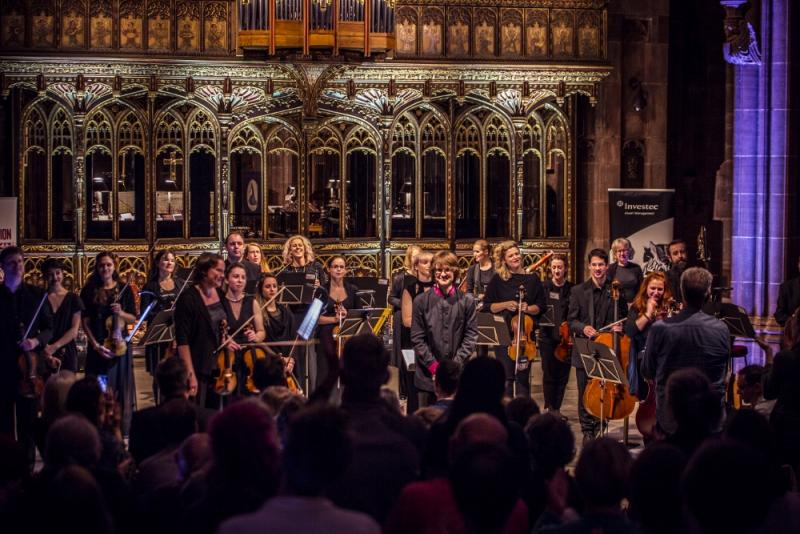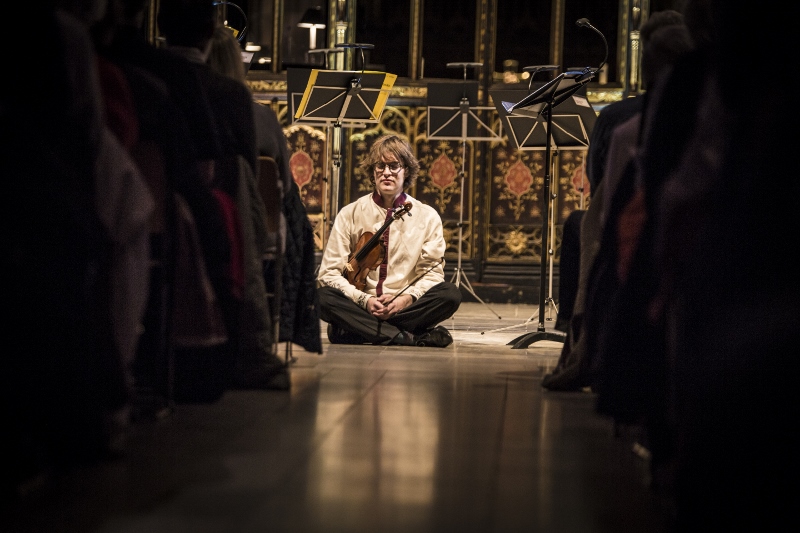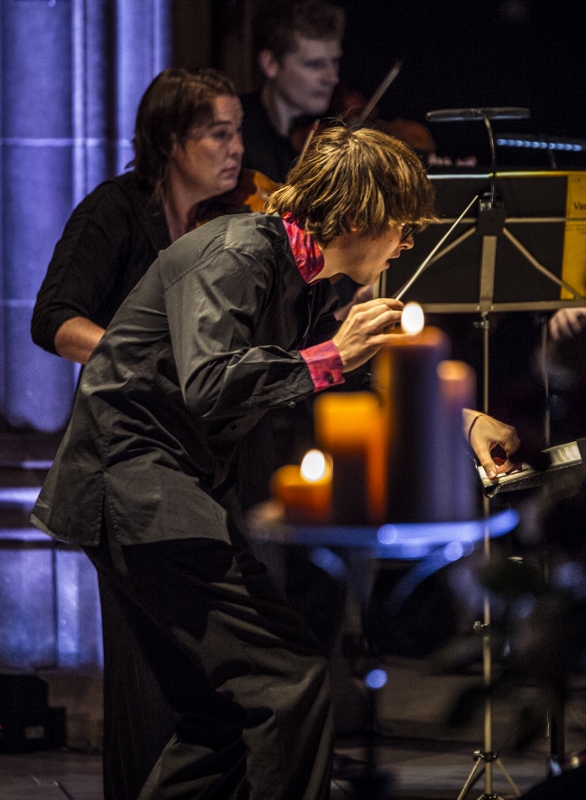Hugo Ticciati, Manchester Camerata, Manchester Cathedral review - spirituality, no spooks | reviews, news & interviews
Hugo Ticciati, Manchester Camerata, Manchester Cathedral review - spirituality, no spooks
Hugo Ticciati, Manchester Camerata, Manchester Cathedral review - spirituality, no spooks
Theatricality is the key to a programme of minimalism plus showbusiness

Manchester Camerata chose All Hallows’ Eve for a concert of (in some part) "holy" minimalism. Arvo Pärt’s Silouan’s Song began it, and his Cantus in Memoriam Benjamin Britten ended it. They headlined it "Spiritualism and Minimalism", but I think what they really had in mind was spirituality. No "one knock for yes" or anything like that, anyway.
Manchester Cathedral - hallowed ground indeed - made an excellent visual setting, its versatile lighting rig used to picturesque effect, and after the buzz of conversation died down there was a ready-made atmosphere of quiet expectation before things began.
Was Hugo Ticciati (pictured below in meditative mode) quite expecting that? The Camerata knows its audience, the publicity suggested we all come prepared for meditation, and it felt as if many were. What we got was a laid-back pre-music spiel from the soloist/maestro, ending with the suggestion that we all do our own version of Cage’s 4'33''. I suppose someone had to say "This is where we begin" (and of course there were the usual crashes of late-comers arriving), but the first Pärt piece, played in the distance in the quire and so quiet at first you hardly noticed it, was a near-unearthly experience of sound emerging from nothingness. Spiritual? Effectively theatrical, certainly - indeed that was the impression of the concert as a whole. It communicated very well and earned a standing ovation at the end. And strangely no one seemed to mind the short, high-pitched bleep that emerged from (I think) some part of the cathedral’s high-tech systems every 30 seconds - most of the time smothered by music, but in the context of real quietness a tiny bit disconcerting.
Spiritual? Effectively theatrical, certainly - indeed that was the impression of the concert as a whole. It communicated very well and earned a standing ovation at the end. And strangely no one seemed to mind the short, high-pitched bleep that emerged from (I think) some part of the cathedral’s high-tech systems every 30 seconds - most of the time smothered by music, but in the context of real quietness a tiny bit disconcerting.
Once re-located in the nave of the cathedral, the musicians’ big piece in the first part was Peteris Vasks’ Concerto for Violin and Strings: Distant Light, from 1997. I am a big fan of Vasks’ music. Whether it counts as "holy minimalism" or not, it can be ineffably beautiful and has an earthy strength that gives it real backbone. Some of its lyrical passages, and the textures of the string writing, can sound quite like Elgar. It’s also incredibly demanding, in this case, on the solo violinist. It’s a concerto, after all, and Hugo Ticciati laid into his role with a will, some showmanship and a lot of energy. Only once did intonation slip a tiny bit, and the contrasts of dynamic in the piece were given at the max.
 Theatrical is also the word that comes to mind to describe Haydn’s Symphony No 45 ("The Farewell"), as well it might. The players each finish playing in turn in the final section and depart the scene: it’s an oft-told story and may have been an early example of musicians’ union affirmative action in pursuit of better conditions. In the first movement the style is Haydn in "storm and stress" mode, and Ticciati, now as conductor, went for that completely. It was a relaxed and fulsome approach, with contrasts and emphases that seemed like Beethoven. Leader Adi Brett and the Camerata forces responded to this vision, and also to the ultra-classical, non-vibrato, non-legato slow movement, its whispered pianissimi at times recalling those of Pärt and Vasks. Ensemble was a wee bit ragged in the jolly bonhomie of the minuet, and the finale’s beginning was a scurrying business until the procession to the exit began.
Theatrical is also the word that comes to mind to describe Haydn’s Symphony No 45 ("The Farewell"), as well it might. The players each finish playing in turn in the final section and depart the scene: it’s an oft-told story and may have been an early example of musicians’ union affirmative action in pursuit of better conditions. In the first movement the style is Haydn in "storm and stress" mode, and Ticciati, now as conductor, went for that completely. It was a relaxed and fulsome approach, with contrasts and emphases that seemed like Beethoven. Leader Adi Brett and the Camerata forces responded to this vision, and also to the ultra-classical, non-vibrato, non-legato slow movement, its whispered pianissimi at times recalling those of Pärt and Vasks. Ensemble was a wee bit ragged in the jolly bonhomie of the minuet, and the finale’s beginning was a scurrying business until the procession to the exit began.
Only this time they didn’t leave the scene entirely, but moved to the back of the cathedral nave for Pärt’s homage to Britten. They’ve played this subtly and memorably before (with Gábor Takács-Nagy, their music director, back in 2013), and gave it the same glowing tone and thrilling crescendo he did. And it was good to find, for once, that the seats at the back got the best sound of all. Maybe there’s a spiritual lesson in that.
rating
Share this article
The future of Arts Journalism
You can stop theartsdesk.com closing!
We urgently need financing to survive. Our fundraising drive has thus far raised £49,000 but we need to reach £100,000 or we will be forced to close. Please contribute here: https://gofund.me/c3f6033d
And if you can forward this information to anyone who might assist, we’d be grateful.

Subscribe to theartsdesk.com
Thank you for continuing to read our work on theartsdesk.com. For unlimited access to every article in its entirety, including our archive of more than 15,000 pieces, we're asking for £5 per month or £40 per year. We feel it's a very good deal, and hope you do too.
To take a subscription now simply click here.
And if you're looking for that extra gift for a friend or family member, why not treat them to a theartsdesk.com gift subscription?
more Classical music
 Kempf, Brno Philharmonic, Davies, Bridgewater Hall, Manchester review - European tradition meets American jazz
Bouncing Czechs enjoy their Gershwin and Brubeck alongside Janáček and Dvořák
Kempf, Brno Philharmonic, Davies, Bridgewater Hall, Manchester review - European tradition meets American jazz
Bouncing Czechs enjoy their Gershwin and Brubeck alongside Janáček and Dvořák
 Solomon, OAE, Butt, QEH review - daft Biblical whitewashing with great choruses
Even a top soprano and mezzo can’t make this Handel paean wholly convincing
Solomon, OAE, Butt, QEH review - daft Biblical whitewashing with great choruses
Even a top soprano and mezzo can’t make this Handel paean wholly convincing
 Two-Piano Gala, Kings Place review - shining constellations
London Piano Festival curators and illustrious friends entertain and enlighten
Two-Piano Gala, Kings Place review - shining constellations
London Piano Festival curators and illustrious friends entertain and enlighten
 Echo Vocal Ensemble, Latto, Union Chapel review - eclectic choral programme garlanded with dance
Beautiful singing at the heart of an imaginative and stylistically varied concert
Echo Vocal Ensemble, Latto, Union Chapel review - eclectic choral programme garlanded with dance
Beautiful singing at the heart of an imaginative and stylistically varied concert
 Scott, Irish Baroque Orchestra, Whelan, RIAM, Dublin review - towards a Mozart masterpiece
Characteristic joy and enlightenment from this team, but a valveless horn brings problems
Scott, Irish Baroque Orchestra, Whelan, RIAM, Dublin review - towards a Mozart masterpiece
Characteristic joy and enlightenment from this team, but a valveless horn brings problems
 Classical CDs: Voice flutes, flugelhorns and froth
Baroque sonatas, English orchestral music and an emotionally-charged vocal recital
Classical CDs: Voice flutes, flugelhorns and froth
Baroque sonatas, English orchestral music and an emotionally-charged vocal recital
 Kanneh-Mason, Britten Sinfonia, Shave, Milton Court - a grin and a big beaming smile
A pair of striking contemporary pieces alongside two old favourites
Kanneh-Mason, Britten Sinfonia, Shave, Milton Court - a grin and a big beaming smile
A pair of striking contemporary pieces alongside two old favourites
 theartsdesk at the New Ross Piano Festival - Finghin Collins’ musical rainbow
From revelatory Bach played with astounding maturity by a 22 year old to four-hand jazz
theartsdesk at the New Ross Piano Festival - Finghin Collins’ musical rainbow
From revelatory Bach played with astounding maturity by a 22 year old to four-hand jazz
 First Person: Manchester Camerata's Head of Artistic Planning Clara Marshall Cawley on questioning the status quo
Five days of free events with all sorts of audiences around Manchester starts tomorrow
First Person: Manchester Camerata's Head of Artistic Planning Clara Marshall Cawley on questioning the status quo
Five days of free events with all sorts of audiences around Manchester starts tomorrow
 Goldscheider, Brother Tree Sound, Kings Place review - music of hope from a young composer
Unusual combination of horn, strings and electronics makes for some intriguing listening
Goldscheider, Brother Tree Sound, Kings Place review - music of hope from a young composer
Unusual combination of horn, strings and electronics makes for some intriguing listening

Add comment